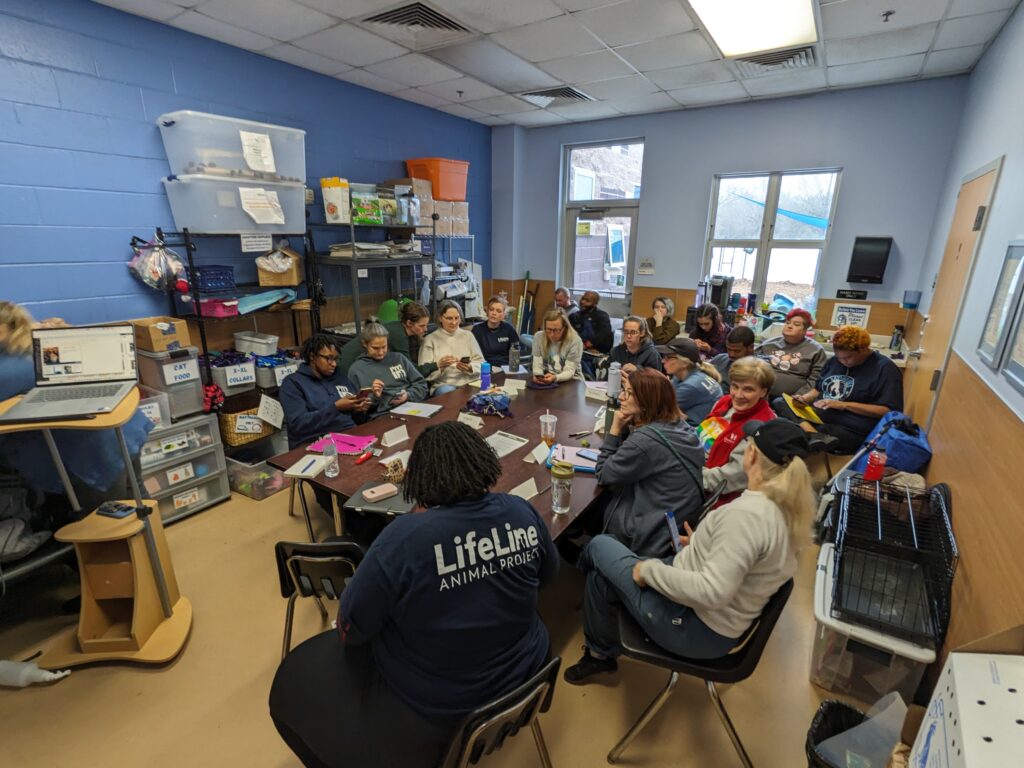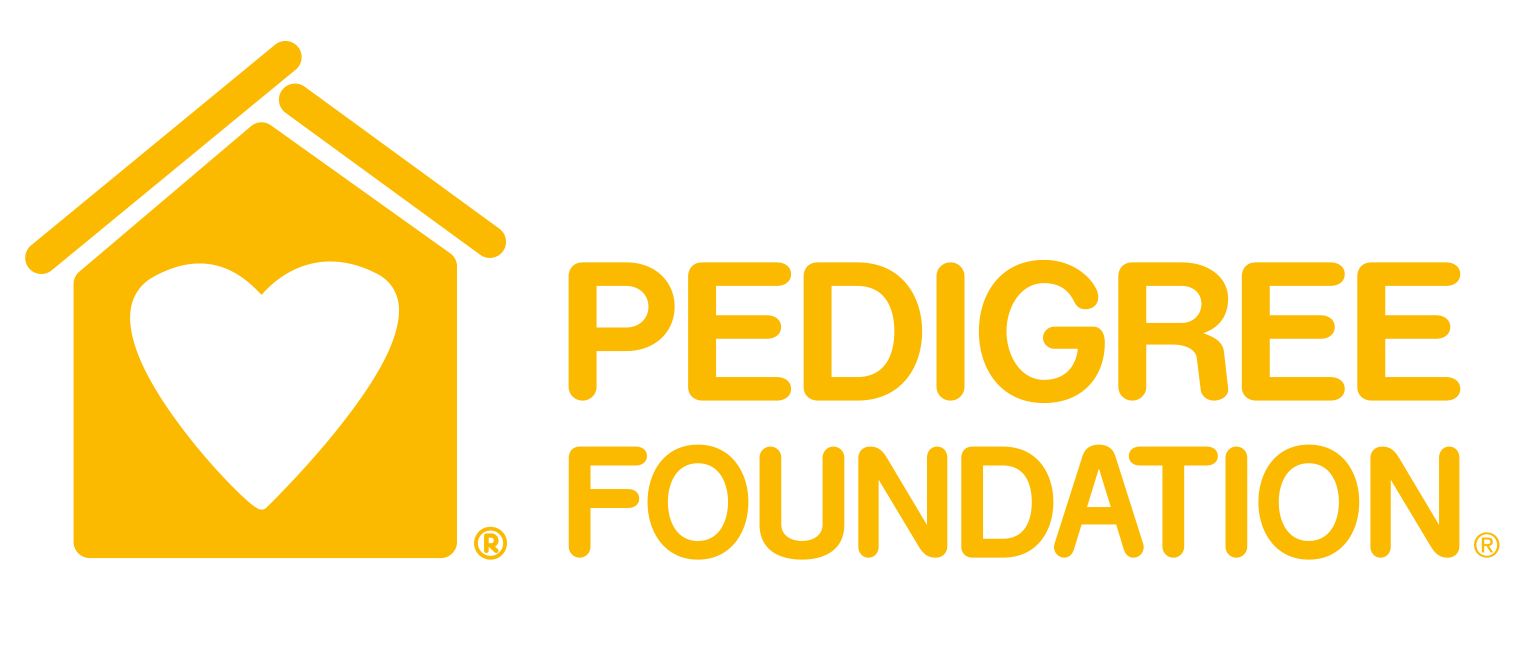Supported by PetSmart Charities, the Competitive Pet Placement Project aims to identify barriers and produce solutions for increasing adoption outcomes

(AUSTIN, TX) July 31, 2024–Human Animal Support Services (HASS), an international project revolutionizing the animal welfare industry by uniting human and animal welfare, announced the results of the Competitive Pet Placement (CPP) Project. An initiative supported by PetSmart Charities, five shelters, alongside HASS, took up the challenge to evaluate internal shelter practices or procedures that may have become unnecessary barriers to positive adoption outcomes.
Launched in 2023, the CPP Project sought to answer three key questions with five participating shelters located across the U.S.: What is it like to be a potential adopter? How often are potential adopters who arrive at the shelter actually leaving with a pet and if they aren’t, why? What audience from the local community is NOT coming into the shelter and can we tell why?
“The data is clear: pets are entering shelters faster than they are being adopted in shelters nationwide. Projects like HASS seek solutions that rise above the current system, decrease the burden on shelters, and increase both pet and community support,” said Maggie Lynch, Senior Director of Data & Research. “We are in a new era of animal sheltering and it’s time we as an industry reflect on the public’s adoption experience from the moment they enter the shelter.”
Upon review of the initial data collection, HASS identified significant gaps in adoption potential and found multiple opportunities to increase adoptions if shelters are willing to address the internal barriers preventing families going home with pets. For instance, upon project completion, the data showed that only one in three families interested in adopting a pet the day they walked into a participating shelter, actually went home with a pet, with the total average adoption conversion rate of participating shelters sitting only at 31%. From these statistics, HASS dug deeper to not only understand why this was, but what were the missed opportunities?
In total, 3,769 pets were adopted during the data collection period. The analysis discovered that if every potential adopter, or interested family, who had visited the shelter and went home empty handed had actually left with just ONE pet, that total would be 11,008 pets adopted–a staggering difference of 7,239 pets who could have been cleared from the kennels. With an industry environment desperate for increasing adoptions, HASS was eager to hear from the public–why weren’t you able to take a pet home that day?
The following are the top customer-reported reasons why, as potential adopters, they left a shelter without a pet:
- Family “still making a decision:” More time needed to ensure they were ready for a new pet
- Pet isn’t ready to leave: Active stray holds, medical requirements not yet met, etc.
- Other: This reason includes multiple internal barriers such as too long of wait times, process to adopt was deterrent, family was not at the right location for specific pet, the client left without ever being helped by shelter staff
- Type of pet unavailable: Specific species, breed, size, age
- Compatibility:Unknown history, behavior or medical requirements such as “good with children.”
- Poor customer service experience
- “Just Browsing”
Utilizing this data, the Competitive Pet Placement project had the opportunity to implement simple solutions to improve the adoption process and help eliminate the internal barriers mentioned above. Through customized implementation measures, specifically focused on collecting public foot traffic data and internal processes improvements, HASS collaborated with participating shelters through new program launches, such as streamlining adoption interest forms or matchmaking process improvements, evaluating and improving adoption field trip programs, surveying client experience at the shelter, onsite matchmaking and customer service trainings for staff, and hosted a successful adoption event based upon heatmap analysis.
To determine the best initiatives to take with each of the five shelters, the HASS team worked directly with each organization’s leadership teams to find the best fit for their organization. This included reviewing each shelter’s low hanging fruit barriers from phase one, learning about each shelter’s unique operations and challenges through interviews, and assessing their data trends. Once an initiative was determined, the HASS team conducted round tables with stakeholders, such as fosters, volunteers, and staff to determine what the effective solution to overcoming barriers may be and how to customize the approach to each organization.
“I always say, going into an animal shelter is already going to be a memorable experience so we should strive to make it a positive one,” said Jairus Hubbard, Adoptions Supervisor for LifeLine Animal Project. “If we want to be good guides toward helping people find their “forever friend,” we need to make ourselves prepared with the right tools so we can meet their needs…and the introduction of these [implementation] tools have been amazing.”
While there will never be a one-size-fits-all approach to increasing adoptions because every shelter and community is different, HASS seeks to utilize the information gathered from the Competitive Pet Placement project to aid shelters in implementing similar solutions within their own doors. Simple how-to’s, guides and toolkits are now available to any shelter to be utilized and customized in tandem with existing efforts to break through the internal barriers preventing adoptions. HASS is calling upon the industry to recognize the opportunity we have collectively to reflect, refine, and re-energize our adoption processes to not only support our shelter staff and community, but save as many lives as possible.
Visit www.humananimalsupportservices.org for more information and register for the upcoming HASS webinar on August 6, 2024 for specific take-aways including additional findings and action plans animal welfare organizations can implement today.
###
About Human Animal Support Services (HASS):
The Human Animal Support Services (HASS) project is a movement seeking to revolutionize the animal welfare industry by leading with and embracing a community support model. By providing both private and municipal animal shelters with equitable access to data-driven resources, education, and implementation tools, HASS aims to create pathways toward unified support systems for pets and their people in every community. Separated into three main pillars education, data, and policy, HASS encompasses a network of more than 1,500 animal and human welfare professionals. A project facilitated by Austin Pets Alive! (APA!), HASS’s 41 pilot shelters and 165 partner organizations have joined the movement by committing to implement the HASS model. To learn more, visit www.humananimalsupportservices.org.
About PetSmart Charities®
PetSmart Charities is committed to making the world a better place for pets and all who love them. Through its in-store adoption program in all PetSmart® stores across the U.S. and Puerto Rico, PetSmart Charities helps up to 400,000 pets connect with loving families each year. PetSmart Charities also provides grant funding to support organizations that advocate and care for the well-being of all pets and their families. Our grants and efforts connect pets with loving homes through adoption, improve access to affordable veterinary care and support families in times of crisis with access to food, shelter and emergency relief. Each year, millions of generous supporters help pets in need by donating to PetSmart Charities directly at PetSmartCharities.org, while shopping at PetSmart.com, and by using the PIN pads at checkout registers inside PetSmart® stores. In turn, PetSmart Charities efficiently uses more than 90 cents of every dollar donated to fulfill its role as the leading funder of animal welfare in North America, granting more than $500 million since its inception in 1994. Independent from PetSmart LLC, PetSmart Charities is a 501(c)(3) organization that has received the Four-Star Rating from Charity Navigator for the past 18 years in a row – placing it among the top one percent of rated charities. To learn more visit www.petsmartcharities.org.





